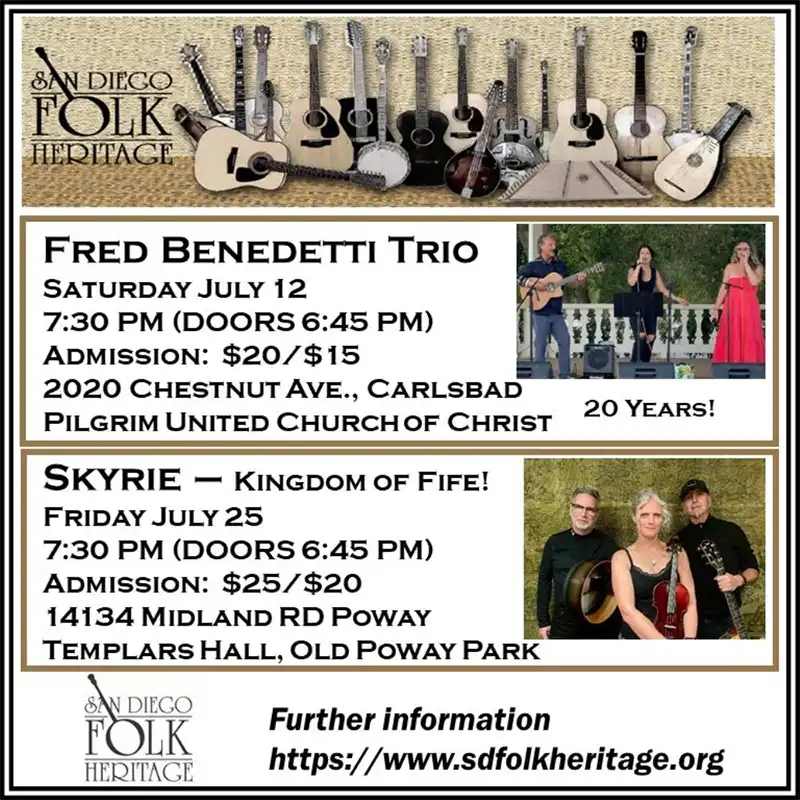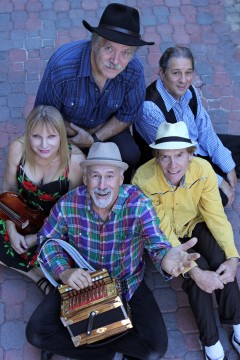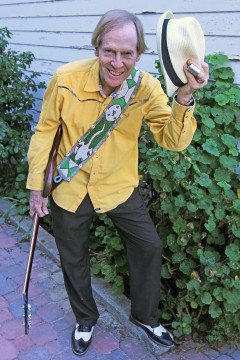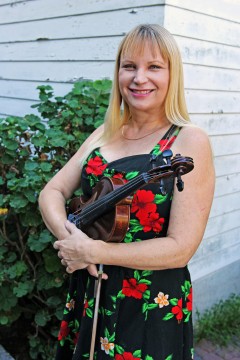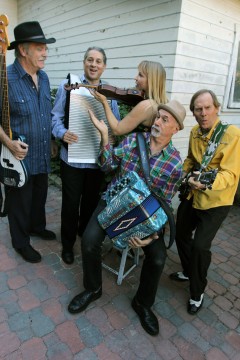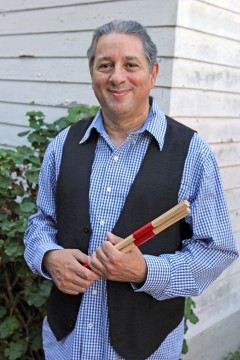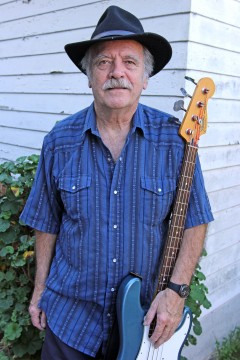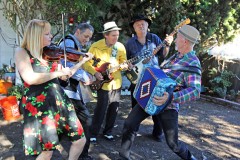Cover Story
CREOLE FOR YOUR SOUL… AND YOUR SOLES! Cajun Spice from the Infectiously Fiery Furnace of Billy Lee & the Swamp Critters
I don’t speak Spanish,
But I understand everything when I’m dancing!
–“I Don’t Speak Spanish” by Bobby Matos and John Santos
Alvin Toffler’s got nothing on this, baby. Thanks to the explosion and availability of information during the 20th century, it has never been easier (or more enjoyable) to appreciate the centuries’ old tradition of how indigenous music reflects the lifestyle and concerns of everyday people, as woven within the spirit of its time. American folk music, by and for the common folk, is an earthy, elastic form in constant mutation. With a lineage careening from the stockyards of slavery ships to the blacktop playground carousel of a hip hop cutting contest, it all began on this continent with field hollers and work songs, laying the call-and-response bedrock for the musical forms that would come to be called the blues and jazz. And thus, influencing every form of American music that we celebrate today.
In part, because the proportions change across the terrain, it remains a mystery identifying the precise ingredients simmering within our alchemical Crock-Pot. Synthesizing new hybrids, serving up its evolutionary stew as musical gumbo, we continue to mix the tried and the true with the borrowed and the blues, and we still manage to invent new variations upon existing themes. It’s a process as old as the hills and as clear as the spirituals demanding: “Let my people go!”
And where is it that The People wish to go? Usually, it’s a place of deliverance. In lieu of salvation, most folks will at least be grateful for anything that provides an escape from the mundane concerns of life. And as far as putting the hoe down and relieving a little tension goes, you really can’t beat the traditional Saturday night dance. In fact, life is dance: literally/metaphorically. It’s also a superb way to grab a little innervation and recreation. In order to experience the absolute zenith of the human condition, explore communities that celebrate life with dance; those are the tribes worth emulating and integrating with.
Every dance needs a bandstand, and a pied piper to call the dancers into motion. And thank your lucky stars, because San Diego plays host to an embarrassment of musical riches, including the timeless Zydeco bop of Billy Lee & the Swamp Critters. Think of them as the musical equivalent of cayenne pepper, with a dash of Tabasco sauce–a full-on Jambalaya taste sensation to tickle your ears and move your feet.
************
Led by musician/songwriter/vocalist Billy Lee Corwin, the Swamp Critters were formed in 2008, after Corwin devoted himself to learning the accordion in order to perform at the annual Gator by the Bay festival. It was a logical extension of the energy Corwin spent over the previous seven years as one of the founding members of the Bon Temps Social Club (“good time club” in Cajun French), an organization dedicated to Cajun—Creole music and culture. The BTSC was the initial brainchild of Corwin’s friend Peter Oliver, and, in 1991, a monthly dance organization was formed to spread the love and enthusiasm for this type of music and dance.
Well, just like an iron caldron that has been slowly simmering on the back burner, Corwin has been soaking up influences and experiences over the past 50 years as a “late, late, late bloomer.” It has all served as a precursor to the cornucopia of good will that is flowing through his life these days, as evidenced by the positive attention that the Swamp Critters are currently receiving.
After successfully entertaining the locals for the past seven years in San Diego County, and recording two eight-song CDs (2008’s The Swamp Critters and 2013’s Lorraine), the Swamp Critters are slowly building an international reputation. On the strength of being invited to perform at the legendary Glastonbury music festival this past June, their opportunities snowballed, resulting in 15 gig offers that had them scurrying across the U.K. for two and a half weeks.
As for how the Swamp Critters ended up at Glastonbury in the first place, Corwin says that it was through the auspices of “a friend of a friend, who knew somebody, who knew somebody else. I’ve been trying for years, but we finally found the right person to hand a CD to. After watching a video of the band performing at Gator by the Bay, they decided to give us a break. When other folks in England found out that we were playing on a good stage at a big festival we started getting these phone calls. They were calling us, saying ‘Hey, are you going to be in Yorkshire? Do you want to play at our venue?’ And, all of a sudden, we have 15 shows booked.
“We picked up a drummer in Cornwall named Dewi Richards, expenses being what they are. He studied our music. Our first gig was Glastonbury, at the big top, a 2,500-seater. He was initially unfamiliar with our material, but he pulled it together, and it went over really well. The biggest thrill for me was playing the green room where the musicians sit and wait before they go onstage to play. It was wonderful, people were coming up to us and handing us cards: ‘Oh, I’ll be your bass player next time you’re here,’ or ‘I’ll be your drummer.’ That was just the best.
“We played almost every day. The coolest gig we played was headlining at the Americana Inter-national Festival in Leicestershire. It’s the biggest of its kind. They put us on Friday night and the stage was huge! The sound guys were fantastic, which calmed us down. Thank God we had already played 12 gigs! And we got a radio interview out
of it.”
As a matter of fact, a DJ from UKCountry Radio.com was waiting for him in the wings after their performance, where Corwin was asked to comment on the group’s sound. “The best way I can describe it is ‘Gulf Coast Music.’ The Gulf Coast, where I’m from, is southeast Texas, along the border of Louisiana. It is mainly influenced by Cajun, Zydeco, and Texas swing. We don’t really do rock or blues. It’s all original material, except for a couple of traditional songs. And it comes out the way it comes out. One of the ways that we set ourselves apart is with our three-part harmonies: we just love to sing, that’s our thing.”
Supplying the gas in the tank for the Swamp Critters is the red hot rhythm section of San Diego natives Gary Nieves on drums and Roger Daschle on the unstoppable bass groove. These gents are capable of locking it in for 90 straight minutes, never dropping a beat or losing the pulse. Daschle is a strong vocalist in his own right, and he also runs his own instrument repair shop: Musictech.
Adding to the contrapuntal intoxication is the stirring fiddle work and harmonizing of Sandra Stram, who deftly balances out the testosterone through her sultry presence. Born and raised in Chicago, Stram earned a masters degree in music at San Diego State University, specializing in performance of the Viola da Gamba, a precursor to the cello. As a music teacher for San Diego City Schools, Stram travels from school to school teaching every discipline of stringed instruments. And as Corwin’s dance partner and instructor, she helps convey other subtleties of the dance, oftentimes leading to a greater appreciation of the music itself.
Rounding out the group’s sound is guitarist and vocalist Bob Pruitt, who comes out of the Missouri blues scene. For 17 years he ran his own recording studio in Columbia, before moving on as a recording engineer in Kansas City and San Francisco. When he’s not playing guitar he teaches electrical engineering at San Diego City College. Along with the B.A. Corwin earned from UCSD, it’s clear that the Critters are a smart, literate bunch of folks. And they sure know how to boogie.
*********************
Although Corwin has played music his entire life, it wasn’t until 2008 that he formed his first band, which is also his current band: the now sizzling Swamp Critters. But it took a lot of life experience before a series of forks in the road led him to the crossroads, and a lifestyle that affords Corwin with the ability to pursue music with “400%” of his attention.
“I was born March 16, 1948 in Long Beach: I’m a native Californian,” he says. “But at six months old I hit the road for Texas. The first 20 years of my life I spent going around Galveston, Houston, and Beaumont in the ‘Bayou Country.’ I had music in the house all the time because of my mother: she made her living as a nightclub performer.
“I first started playing an instrument when I was 17. My mother’s guitar player said to me, ‘Here’s a classical guitar.’ It was an old scratched and beat up ’50s Harmony. He said, ‘If you practice what I tell you to practice, I’m going to come back in a week, and if you’ve done the work, you can have the guitar.’ So I said ‘Okay, I’ll do that!’ So I really practiced, and in a week he came by and gave me the guitar. That changed my life! Because I was really, really, really shy. My mother was this big personality, she walked into the room and she was the life of the party. And I just kind of watched. I was horribly shy, I never dated in high school. But the guitar brought me out.
“I went into the navy from 1968 to ’72–I experienced the Tet Offensive. But when I got out of the service I had the G.I. Bill to get me through school. I thought if I get a degree in music, there isn’t anything I’ll be able to do with it. But I knew I wouldn’t go to the library and learn this stuff on my own, and I would never have a better chance. I just couldn’t make up my mind.
“And then I bought a house in 1976 and that’s what got me started on my path of financial independence. I decided to get a music degree, but I’d get a minor in something else that was related, and that was video production. I did an internship my senior year with Children’s Hospital. That’s where I met Peter Oliver and Jim Rust. Actually, I met Peter Oliver at Grossmont College in 1973 in Spanish class.
“When I started at Grossmont I wasn’t sure about music, because my mother struggled so much financially, and I just didn’t want to have that life. I needed to establish a secure financial situation first. I invested in houses when I was at UCSD, and things kind of fell into my lap. It’s taken me three, four decades. And when I got to the point where the houses were paying me back, I looked at the books and thought I could continue working and keep making money, or I can get out now and live frugally. I’ll have a roof over my head, and I’ll have food, and I can pay all my bills, but I’ll have all my time. So, in 2000, I quit my job doing video production for the school district, and now I have all my time to do whatever I want. And that, of course, is music. I feel elated that I am actually doing what I’ve been dreaming of all my life.”
And that elation is evident in the performances the Swamp Critters have been laying down for the past seven years. The BTSC and the GBTB festival are celebrations of life itself. If you’re not interested in having a good time, you should definitely stay away from these guys, because their positive attitude is infectious.
***************
Corwin says that when he went to UCSD he couldn’t make up his mind about what he wanted to study. Should it be philosophy, math, psychology, or astronomy? “And I found out that the further you go into each area, they merge,” he says. “Like math, for example. If you get into imaginary numbers, math becomes philosophy at a certain point. As you go deeper and deeper, you have to explore these different philosophies.
“Music is the first official science; I think the Greeks originated it. But there’s a lot of math in music. And there’s really philosophy in music, too, when you get into it. Why does this chord make you feel this way? Is it my cultural influence? Is it nature or nurture?”
What about an idea that could revolutionize the world? “I would say that idea is music itself. That’s one of the reasons why I got into music: to help change the world. I know that’s very idealistic, but I’m an old hippie at heart, and I care about the environment.
“One thing I decided a long time ago is not to do any negative music. I will not sing a song that says ‘Oh, my baby left me, I’m gonna go jump off a bridge.’ I make damn sure we don’t have any of those songs. And whatever I can do to plant a little seed about either saving the planet, or maybe handling things a little better, I try to slip it in there with fun entertainment. Even the songs I sing about climate change I approach with a sense of humor, because you can’t preach to people. Of course, we do the ‘regular stuff,’ but whenever I can slip in something–that’s really one of the reasons why I set myself up to do this.”
From the way Corwin talks, it sounds like he’s invested in the spirit of cooperation, rather than the spirit of competition. “I wish nowadays more people would at least put lip service to that, I think it would help. Because talking the talk at least sets the tone, and gets some people moving in that direction.”
*****************
As the Bon Temps Social Club took off, Corwin became the dance coordinator for the club. His passion for the discipline led him to study and master all partner dances, and he has taught at some of the biggest festivals in the country, as well as for the Sweetwater Adult Education Program. His love for dance is an immeasurable asset when it comes to making music that compels others to get up and move.
As for the future, Corwin says he’s “always writing tunes. Writing is not hard for me. This is a Zydeco tune, and to be true to Zydeco dancers, they want a certain kind of thing. I know what that thing is. I was raised two blocks from one of the best Zydeco bars in all of Southeast Texas. When Peter brought this idea along, I already had this stuff with me, so it was a natural thing that came together.”
What makes Zydeco music special? “It’s the bass and the drums. I would start there, because I’ve had a lot of trouble with drummers, especially good drummers, because they’ve worked so hard to get all of their chops down. It’s not fancy. It’s simple. It can even be boring, but if you think of it as a dancer would, it becomes like a mantra or a meditation. It’s simple. It’s made to dance to.”
Corwin says that he’d like to be known as the “fresh, new, up-and-coming old hippie. Starting late in life, I’m not burned out. I’m willing to put in the time and go on the road. I’m excited about learning–I’m totally into it like a young kid.
“There are so many folks out there, who think that maybe they could do well in music, once they finish with the kids, house, career, etc. I’d like to show the old folks who think maybe they missed the boat, or took the wrong fork, that they can still do it! We’re going to Spain next June. We already have five gig offers, plus a few others from Britain. It’s really exciting and the future looks promising!”
The Swamp Critters are a sterling example of what happens when you freely share your passion with the world at large. That smile you send out does indeed return to you–tenfold. And it’s beautiful to know that you don’t have to travel 2,000 miles to experience top-shelf Cajun—Zydeco music these days. If you’ll please pardon me, my senses are on fire–so I’m going to grab some cornbread and a cold beverage and chill out for a bit. And after I catch my breath, I’ll see you back on the dance floor!
Billy Lee & the Swamp Critters perform December 5 in Balboa Park for December Nights on the Laurel Street Stage at 6:50pm. December 11 they perform at Java Joe’s opening for Sara Petite, and December 20 they are performing at the Ferry Landing in Coronado from 1 to 4pm. For more information check their Facebook page.
The Bon Temps Social Club happens on the second Saturday of every month at the War Memorial building on Park Blvd. For more information go to www.icajunzydeco.com
The Gator by the Bay festival happens every Mother’s Day weekend (this year it is on
May 5—8, 2016). For more information go to
www.gatorbythebay.com


